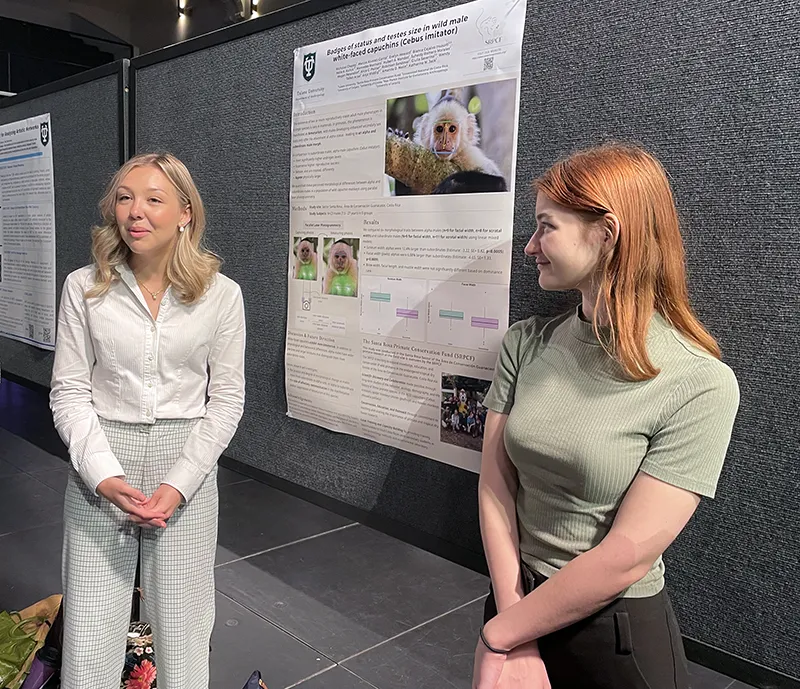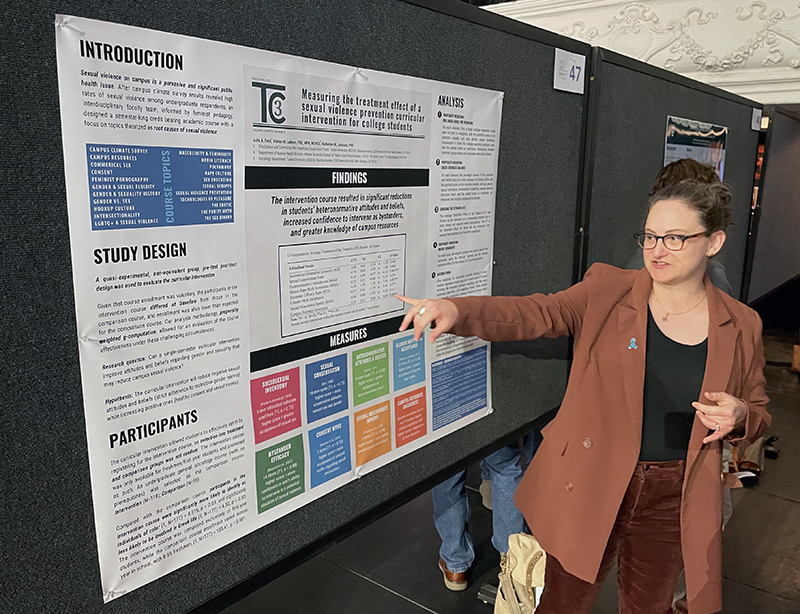
The 3rd annual Tulane Research, Innovation, and Creativity Summit (TRICS) brought together undergraduates, graduates, fellows, faculty, and research staff for a two-day showcase at the Civic Theatre in Downtown New Orleans. Taking place from April 9–10, research posters and presentations spanned all disciplines and schools, with a strong showing from the School of Liberal Arts. Presenters hailed from departments like Anthropology, Sociology, Political Science, English, and Gender and Sexuality Studies, and contributed on a range of fascinating topics — demonstrating not only the diversity of liberal arts research, but also the creativity embedded in their methodologies. From radiocarbon dating and geochemical analysis to data science models and qualitative analysis tools, these projects revealed the dynamic ways SLA scholars investigate the world.
Julia Sjödahlis a PhD student specializing in the archeology of the Andes. Her poster presented the pilot research for her dissertation project at a site called Arpiri in Ayacucho, Peru.
“The Huancasancos region in the south-central highlands of Ayacucho, Peru, is an archaeologically rich yet relatively understudied area,” Sjödahl wrote in her abstract. Her project, "Excavations at Arpiri, an Early Horizon (800-200 BCE) Site in Huancasancos, Ayacucho, Peru,” detailed the results of excavation and material analysis from the site, where the identification of certain ceramics and obsidian materials revealed evidence of continuous trade and contact within communities along the southern coast.
“Following fieldwork, we carried out radiocarbon dating of a circular structure, and geochemical analysis (portable x-ray fluorescence) of obsidian tools,” she shared. “In the future, we'll expand excavations to better understand the social and economic development of this area.”
In her presentation “Teaching with Tarot: The Art of Asking Questions and Discussing Values,” Associate Professor of Philosophy and Gender and Sexuality Studies Georgi Gardner explores an ancient art form from an epistemological perspective, and argues its value as a pedagogical tool in the liberal arts. “Teaching with tarot foregrounds interpretative and dialogical skills to explore scholarly ideas. It is engaged, object-based learning,” she shared. Through her research on the history of tarot, various tarot decks (including the Newcomb Archives’ tarot collection), and other scholarly perspectives, Gardner has developed a host of resources for those wanting to bring tarot into the classroom.
“Tarot cards are aesthetically rich,” she explains in her abstract. “They offer layers of meaning, interpretative depth, and cultural allusion, especially referencing classical mythology, theology, art, and history. These images sharpen contemplative, creative attention on nuanced social and philosophical themes, such as power, labor, duty, relationships, value, and death. This makes tarot an excellent tool for teaching in college classrooms.”
Research by undergraduate Avery Edwards (SLA ’26), a Sociology and Spanish major, Newcomb scholar, and undergraduate research assistant at the Newcomb Institute, explored some of the challenges to data collection and research in the humanities, with her project, “It Takes a Village: Considerations when Conducting a Scoping Review on Self-Managed Abortions in Illegal Settings.”
“This study emphasizes the importance of interdisciplinary collaboration in reproductive health research,” Edwards explained in her abstract. Edwards and her team utilized qualitative analysis software (Covidence) as a tool to initially screen articles needed for full review, to then examine how researchers study Self-Managed Abortions (SMA) in legally restricted settings, focusing on methodological strategies that address ethical and legal concerns.
“I am most proud of the ways in which our research team tackled such a legally and ethically nuanced topic on a global scale. The magnitude of our scoping review felt daunting at first, but learning how to navigate Covidence, refine our inclusion criteria through ongoing communication, and engage in open discussions about article conflicts made the process deeply rewarding. It has been both intellectually rigorous and highly collaborative. I have learned to ask better questions, think more critically about methodologies, and problem-solve independently while relying heavily on my team’s insights. This balance and embracement of the iterative process has shaped how I think about research moving forward.”
Other SLA presentations included:
Alexis Culotta
Professor of Practice, Art
"A Digital Tool for Analyzing Artistic Newtworks"
Nghana Lewis
Associate Professor, English and Africana Studies
“Won’t Somebody Please Think of the Children: A Model for Fostering Rehabilitation, Accountability, and Cost-Efficiency in Louisiana’s Juvenile Justice System”
José Nicolás Cabrera-Schneider
PhD Candidate, Latin American Studies
“Discourse Adaptation Around Mines in the Andes”
Renzo Aurazo Diaz
PhD Candidate, Political Science
“Workers on the Edge: Unraveling the Causes of Riotous Protest Actions”
Julie Ford
PhD Candidate, City, Culture, and Community Program
“Measuring the treatment effect of a sexual violence prevention curricular intervention for college students”
Evelyn Howard (SLA ‘26)
Anthropology
“Two types of males? Morphology and dominance in wild capuchin monkeys”
Noah Fisher (SLA ‘25)
Political Science
“JLN Research: An Exploration of Data Science Strategies for Enhancing Financial System Resilience Through Novel Hybrid Network Architectures”

Julie Ford, PhD Candidate in the City, Culture, and Community Program, presents her poster to TRICS judges.

